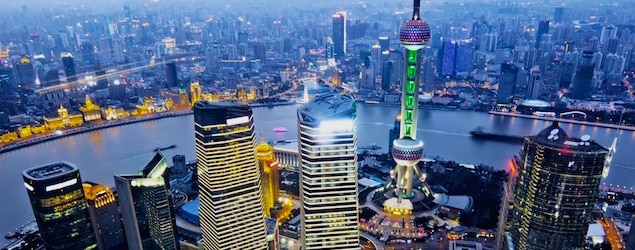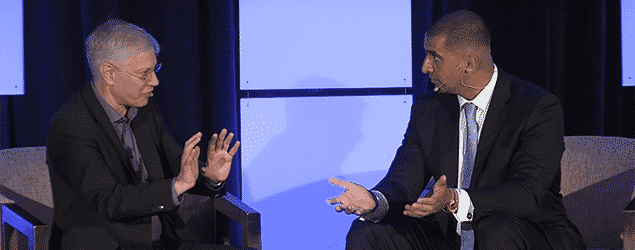Ayn Rand and Free Market Revolution in China

In September, ARI’s executive director Yaron Brook traveled to China to promote the newly published Chinese translation of Free Market Revolution: How Ayn Rand’s Ideas Can End Big Government. We recently had the chance to sit down and talk about his China trip.
Carl: Tell us a bit about the backstory to the Chinese edition of Free Market Revolution.
Yaron: I doubt many people realize it, but most of Ayn Rand’s works have been translated and published in China. Six years ago, at the time of the publication of Atlas Shrugged in Chinese, I was invited to participate in a seminar on Ayn Rand and Atlas Shrugged in Beijing. It was a thrilling experience to sit in a room with about a dozen leading Chinese academics and about 60 students and discuss Ayn Rand. That was my first exposure to Chinese intellectuals interested in Objectivism. I was very impressed.
During this trip I gave seven public talks around the country, and after each one, I met people who told me that they had read Ayn Rand and studied Objectivism. I met scholars and intellectuals who regarded themselves as Objectivists.
In Free Market Revolution, Don Watkins and I argue that Ayn Rand’s ideas are indispensible to building a free society. The publisher — one of the largest in China — choose to translate and publish our bookbecause they thought it was interesting, and that it would be an important contribution to the debate in China.
While I cannot vouch for the translation, friends who know Chinese have told me it is quite good.
Carl: How has the book been received in China?
Yaron: I would say that Free Market Revolution has received an impressively serious reaction from Chinese academics, in some respects, more so than in the U.S. The academics I met in China really engaged with the book’s arguments, something I wish we saw more of here.
At Peking University, I spoke to an audience of economics masters and PhD students.
I gave another presentation, also in Beijing, in front of about 35 intellectuals. It was followed by over a dozen commentaries by those attending. Some agreed with our ideas, others did not. But all had read the book and treated it with respect. In some cases, their copies were full of highlighted sections and it showed in their comments.
My experience was similar at other venues. At the Unirule Youth Forum in Beijing, a forum run by a local free-market think-tank, the students were very engaged. My talk was followed by commentary from Professor Feng, who leads the think-tank, and two other intellectuals.
I also spoke at the “Free Thinkers” club in Beijing. Who knew a free thinkers club would be allowed? This talk is now available on You Tube.
In Xian, where I gave a talk at Jinhe Center of Economics Research at Xi’an Jiaotong University, my talk was heavily promoted. There were giant posters — the largest I’ve ever seen — all over campus. My picture was on all of them and the word “Capitalism” was highlighted across the top. About 250 students showed up, which was terrific. Most of the talk is now available on YouTube — despite the fact that officially you cannot get YouTube in China.
My final talk was at Jifeng Bookstore in Shanghai. Over a hundred people showed up, and I’d say most of them were in their twenties. That’s a remarkable turnout for a bookstore event. They were very engaged and the Q&A was excellent. You can see my talk and the entire Q&A here (YouTube).
Carl: You said the audiences were really engaged. Did you get a sense of their own views, and how comfortable they felt with ideas that challenge communist ideals?
Yaron: What’s amazing is that the questions in the Q&A were almost identical to what you might expect from American college students. First, they were not Marxists, or any more leftist than American or European students. Maybe less. Second, I didn’t get the sense that they were censoring themselves. Nor was I censoring myself.
You could get the sense, though, that people are not supposed to criticize Mao or the ruling communist party. If someone did, you could hear a nervous chuckling from the audience. But there was no uproar and nobody who got upset, at least not in the lecture hall.
What I’ve heard is that in China, so long as people talk about philosophy, economics, or politics in the abstract, so long as criticisms are phrased abstractly, then they can get away with a great deal. It’s when you start talking specifically about Chinese politics, policies, regimes, or history that people can get into trouble.
Carl: The Chinese government is well known for its censorship. Was that a factor during your trip?
Yaron: There’s a fascinating, complicated openness to ideas in China. A couple of examples. I met the publisher of a journal that is read by the leadership in the communist party, and I was invited to submit articles to that journal. And later, while signing books, I got business cards from government officials who were interested in the topic.
As far as I know the only censorship in the book itself was related to passages in the book that were critical of Mao Zedong. Their was no censorship with regard to any of the actual ideas we present.
But in China, you never know when or what will be censored. Initially, the publisher of the translation of Free Market Revolution had no issues with the censors. But then they approached a well-known dissident in China, someone who’s considered sympathetic to Objectivism, and asked him to write a foreword for the book. After printing 6,000 copies, the publisher suddenly got a phone call from Beijing. The censors said that the foreword had to go, because in it, the author supposedly criticized some recent government action.
Carl: I believe you also stopped in Hong Kong.
Yaron: That’s right. I attended the General Meeting of The Mont Pelerin Society. Mont Pelerin is an association of classical liberal intellectuals founded in the 1940s by Friedrich Hayek, Ludwig von Mises & Milton Friedman, among others. I have been a member for 4 years now and attend many of their conferences. While I was not on the official program, ARI sponsored a breakfast in which I gave a talk on Ayn Rand and the inequality debate. The audience consisted of academics and the heads of think tanks from the US, Asia, Australia and Europe. It was a very high level group and the talk was very well received and has already resulted in invitations to speak on the topic elsewhere.
Carl: Any final words on your trip to China?
Yaron: The developments in China are fascinating. There’s an openness to capitalist ideas — but also censorship. People behave as if there is private property — but there really isn’t. There is no independent judiciary. So everything can be taken away at anytime. The government owns the land, people “lease” it, but treat it as if it were private. There is little regulation or redistribution of wealth and this allows for quite a bit of freedom. The consequence of which is that people are flourishing and the economy has grown by astonishing rates in the past 30 years. Indeed, in sheer numbers, more people have risen out of poverty in China in the last thirty years than in all of human history. Many remain poor, but you can also see a growing middle class and some really wealthy people. People are energized, they seem vibrant and alive. The skyscrapers in Shanghai are just amazing, and so is the energy of the people in the streets.
Hong Kong is definitely a place I’d encourage people to visit, at least once in their lives, because it’s just amazing what they have achieved in the last seventy years.
China is just astounding, and it was heartening to see how interest in Ayn Rand’s ideas is growing there.
There is an interesting intellectual, philosophical vacuum in China. From what I’ve observed, people are not Marxist or communists, but they are not anything else either. Their ancient philosophies are not robust and are not treated very seriously. They have no real religion. They seem to like material wealth – I do not get a sense that wealthy Chinese feel the same guilt as Americans do. Yet they have no moral framework. So, for the most part, I think they are pragmatists. This might offer Objectivism an interesting opportunity – the intellectual barriers we would face are lower than in many places in the world.
Of course, the cultural and language barriers are great, and ARI has very limited resources. But China is interesting intellectually.



